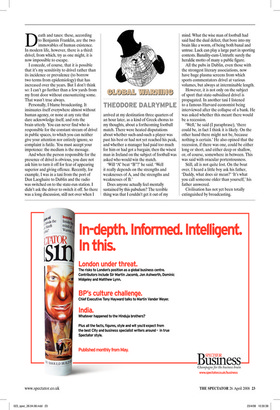D eath and taxes: these, according to Benjamin Franklin, are the
two immovables of human existence. In modern life, however, there is a third: drivel, from which, try as one might, it is now impossible to escape.
I concede, of course, that it is possible that it’s my sensitivity to drivel rather than its incidence or prevalence (to borrow two terms from epidemiology) that has increased over the years. But I don’t think so: I can’t go further than a few yards from my front door without encountering some. That wasn’t true always.
Personally, I blame broadcasting. It insinuates itself everywhere almost without human agency, or none at any rate that dare acknowledge itself, and rots the brain utterly. You can never find who is responsible for the constant stream of drivel in public spaces, to which you can neither give your attention nor entirely ignore, so complaint is futile. You must accept your impotence: the medium is the message.
And when the person responsible for the presence of drivel is obvious, you dare not ask him to turn it off for fear of appearing superior and giving offence. Recently, for example, I was in a taxi from the port of Dun Laoghaire to Dublin and the radio was switched on to the state-run station. I didn’t ask the driver to switch it off. So there was a long discussion, still not over when I arrived at my destination three quarters of an hour later, as a kind of Greek chorus to my thoughts, about a forthcoming football match. There were heated disputations about whether such-and-such a player was past his best or had not yet reached his peak, and whether a manager had paid too much for him or had got a bargain; then the wisest man in Ireland on the subject of football was asked who would win the match.
‘Will “A' beat “B'?’ he said. ‘Well it really depends on the strengths and weaknesses of A, and the strengths and weaknesses of B.’ Does anyone actually feel mentally sustained by this pabulum? The terrible thing was that I couldn’t get it out of my mind. What the wise man of football had said had the dual defect, that bore into my brain like a worm, of being both banal and untrue. Luck can play a large part in sporting contests. Banality-cum-Untruth: surely the heraldic motto of many a public figure.
All the pubs in Dublin, even those with the strongest literary associations, now have huge plasma screens from which sports commentators drivel at various volumes, but always at interminable length.
However, it is not only on the subject of sport that state-subsidised drivel is propagated. In another taxi I listened to a famous Harvard economist being interviewed after the collapse of a bank. He was asked whether this meant there would be a recession.
‘Well,’ he said (I paraphrase), ‘there could be, in fact I think it is likely. On the other hand there might not be, because nothing is certain.’ He also opined that the recession, if there was one, could be either long or short, and either deep or shallow, or, of course, somewhere in between. This was said with oracular portentousness.
Still, all is not quite lost. On the boat over, I heard a little boy ask his father, ‘Daddy, what does sir mean?’ ‘It’s what you call someone older than yourself,’ his father answered.
Civilisation has not yet been totally extinguished by broadcasting.










































































 Previous page
Previous page